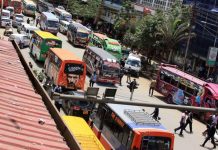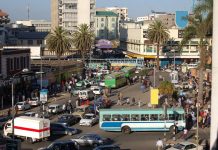When the crackdown on public service vehicles was announced, we were made to believe that the preparations were thorough and meticulous.
Yet it was clear from the word go that the exercise was indecisive and was skirting the most acute problem of matatus — impunity.
I commute daily between Ruaka and Parklands, via Gigiri, Nairobi, where this impunity is astounding for a so-called diplomatic neighbourhood, where many senior government officials reside.
On others routes, the culture is more notorious.
Towards Ongata Rongai few days ago, two matatus racing against each other were swirling from either side of the road rudely wriggling through traffic by overlapping and obstructing in flagrant abuse of traffic rules and decency.
At one point the crew hurled humiliating insults at a motorist who dared protest their crude antics.
Earlier the same week, I had passed through Outering Road and encountered the same impunity at Embakasi area.
The matatus stop right in the middle of the road to tout for passengers, greatly slowing traffic flow.
In the recent past, matatu crew have assaulted private motorists who have resisted intimidation. We have also heard recent cases of matatu touts fatally throwing passengers off speeding vehicles.
Such conduct is unacceptable in any civilised society and where a government minds its integrity and its people.
This is why the current crackdown has been unconvincing.
It has concentrated more on the mechanical conditions of the vehicles rather than the operational milieu, which is of greater concern to the public.
No one minds matatus with safety belts and fire extinguishers, but, first and foremost, we need to immediately eradicate this open defiance of the law and outright social indiscipline by matatus.
When a section of the public is allowed a window of illegality, their impunity acquires an independent culture that becomes more vicious and dangerous to the society.
We saw this with Mungiki in late 1990s, when the government tolerated budding of criminal gangs for political expediency, which later flourished into formidable social and security nightmares. To date, the small scale economy in most of central Kenya remains dead, thanks largely to the Mungiki menace.
Matatu impunity is ominously taking the same pattern and may soon snowball into a national crisis which may later boomerang on the government.
When our children ask why matatus do not stop at the red lights and why police do not arrest them, what are we supposed to answer?
Yet national ethos is best passed across generations by parents to their children.
Children who see their parents obey traffic laws ought to also see consequences when people defy the law.
If this crackdown on matatus is to make sense and have a national value, priority should be to bring their operations within law and order.







![Top 20 Used Cars to Avoid Buying in Kenya – [PHOTOS]](https://kenyacarbazaar.com/blog/wp-content/uploads/2013/11/top-used-unreliable-cars-to-avoid2-80x60.jpg)

![Here are some of the best tuned cars in kenya by state of the art garages [PHOTOS]](https://kenyacarbazaar.com/blog/wp-content/uploads/2013/11/29402_10151301757042065_340470732_n-e1384498044289.jpg)



![Top 20 Used Cars to Avoid Buying in Kenya – [PHOTOS]](https://kenyacarbazaar.com/blog/wp-content/uploads/2013/11/top-used-unreliable-cars-to-avoid2-100x70.jpg)






